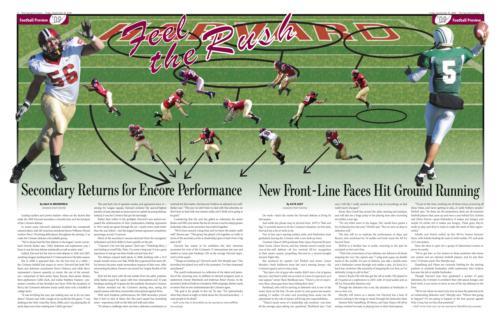
News
Summers Will Not Finish Semester of Teaching as Harvard Investigates Epstein Ties

News
Harvard College Students Report Favoring Divestment from Israel in HUA Survey

News
‘He Should Resign’: Harvard Undergrads Take Hard Line Against Summers Over Epstein Scandal

News
Harvard To Launch New Investigation Into Epstein’s Ties to Summers, Other University Affiliates

News
Harvard Students To Vote on Divestment From Israel in Inaugural HUA Election Survey
FOOTBALL '09: Secondary Returns for Encore Performance

Leading tacklers and proven leaders—these are the factors that make the 2009 Harvard secondary a forceful unit, and the lynchpin of the Crimson defense.
In recent years, Harvard’s defensive backfield has consistently enjoyed talent, with All-American standouts Steven Williams ’08 and Andrew Berry ’09 joining skill players throughout the starting 11 to make the Crimson defense a formidable group.
“We’ve always had the best defense in the league,” senior cornerback Derrick Barker says. “[My] freshman and sophomore year, I know it was the best defense statistically as well as talent-wise.”
Indeed, Harvard led the Ivies in total defense in 2006 and 2007, notching a league-leading total of 15 interceptions in the latter season.
But in 2008, it appeared that—for the first time in a while—the Crimson faithful had reason to worry. Harvard lost both Williams and defensive coordinator Kevin Doherty, and while Berry represented a known quantity at corner, the rest of the secondary—comprised of then-senior Ryan Barnes, then-junior Barker, then-sophomore Collin Zych, and rookie Matthew Hanson—presented a number of less-heralded new faces. With the exception of Berry, the Crimson’s defensive backs could claim only a handful of college starts.
“It was terrifying last year, just making sure not to let my team down,” Hanson says with a laugh as he recalls his first game. “I was looking at the Holy Cross film [from 2008], and I was playing like 20 yards deep every time making sure I didn’t get beat.”
The unit had a lot of question marks, and opponents knew it—among Ivy League squads, Harvard endured the second-highest number of pass attempts as teams strove to exploit its young defense. Instead, it was the Crimson that got the last laugh.
Rather than wither in the spotlight, Harvard’s new starters surpassed the achievements of their predecessors, holding opponents to 190.4 yards per game through the air—nearly seven yards better than the year before—and the league’s lowest opponent completion percentage, at only 53 percent.
Much of the secondary’s success stemmed from the youngsters’ enthusiasm and their ability to learn quickly on the job.
“I learned a lot over last season,” Zych says. “[Watching film], I was looking at myself like, ‘Man, I’ve come a long way.’ It was a great experience to just get out there finally and just have fun.”
The defense enjoyed itself plenty in 2008, finishing with a 10-0 smash-mouth victory over Yale. While Berry garnered first-team All-Ivy honors, his peers made tremendous impacts of their own. After overcoming his jitters, Hanson was named Ivy League Rookie of the Year.
Zych led the team with 48 solo tackles from his safety position, while Barker paced the squad with four interceptions and 10 pass breakups, starting all 10 games for the suddenly-dominant Crimson.
Barnes rounded out the Crimson’s starting four, saving the squad’s season with three memorable interceptions against Penn.
With such breakout performances, the 2008 secondary proved that it had no lack of talent. But this year’s squad has something extra—experience, both on the field and with each other.
“It’s always a challenge when you lose a defensive coordinator, or anybody for that matter...but last year I believe we adjusted very well,” Barker says. “This year we don’t have to deal with that adversity, we don’t have to deal with new starters really, and I think we’re going to be great.”
Considering that the unit has gelled so cohesively, the senior Barker and fifth-year senior Barnes do not see a need to adopt greater leadership roles, as the secondary has evolved together.
“We’ve been around a long time, and we know the system really well,” Barnes says. “This group has played a lot together, so really in terms of the secondary, as far as [leadership] goes, it hasn’t been a big deal at all.”
Harvard has reason to be confident—the four returnees accounted for nine of the Crimson’s 15 interceptions last year and totaled as many pass breakups (29) as the average Harvard opponent’s entire squad.
“Things are looking up,” Harvard coach Tim Murphy says. “Our secondary has played very well in the preseason. I’ve been impressed and pleased.”
The coach’s endorsement is a reflection of the talent and potential of the returning core, in addition to talented prospects such as sophomore Danny Minimede and freshman Brian Owusu. As the secondary looks to build on a breakout 2008 campaign, Barker wants to ensure that no one underestimates the Crimson again.
“My goal is for people to fear us,” he says. “For quarterbacks, when they dream at night, to think about the Harvard secondary…I want people to be afraid.”
—Staff writer Max N. Brondfield can be reached at mbrondf@fas.harvard.edu.
Want to keep up with breaking news? Subscribe to our email newsletter.
